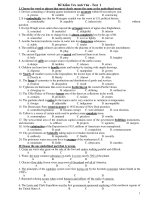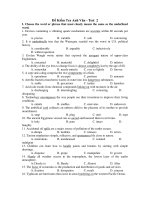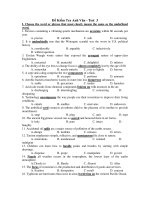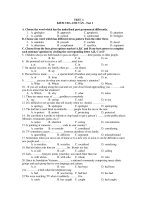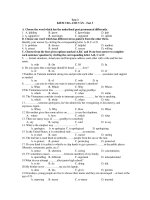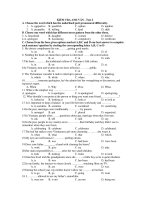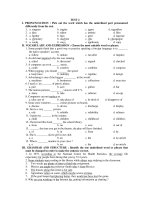Đề Kiểm Tra Anh Văn - Test 2 pptx
Bạn đang xem bản rút gọn của tài liệu. Xem và tải ngay bản đầy đủ của tài liệu tại đây (66.04 KB, 9 trang )
Đề Kiểm Tra Anh Văn - Test 2
I. Choose the word or phrase that most closely means the same as the underlined
word.
1. Devices containing a vibrating quartz mechanism are accurate within 60 seconds per
year.
A. precise B. variable C. safe D. convincing
2. It is undoubtedly true that the Watergate scandal was the worst in U.S. political
history.
A. considerably B. arguably C. indecisively
D. without question.
3. Evelyn Waugh wrote satires that exposed the arrogant nature of upper-class
Englishmen.
A. conceited B. masterful C. delightful D. inferior
4. The ability of the eye lens to change focus is almost completely lost by the age of 60.
A. somewhat B. nearly entirely C. ever so lightly D. forever.
5. A cope and a drag comprise the two components of a flask.
A. operations B. excerpts C. portions D. amounts
6. Aerobic bacteria transforms wastes in water into less dangerous substances.
A. stable B. precarious C. tender D. harmless
7. Acid rain results from chemical compounds linking up with moisture in the air.
A. discharging B. intermingling C. concuring D.
dissipating
8. Technology encompasses the way people use their inventions to improve their living
conditions.
A. entails B. enables C. enervates D. endeavors
9. The umbilical cord colinects an unborn child to the placenta of its mother to provide
nourishment.
A. snap B. plug C. unit D. rope
10. The ancient Egyptians viewed cats as sacred and honored them in art forms.
A. holy B. pure C. intact D.
haughty
11. Accidental oil spills are a major source of pollution of the earths oceans.
A.slumps B. tumbles C. releases D. errors.
12. Taoism emphasizes simple, reflective, and spontaneou life close to nature.
A. meticulous B. unrehearsed C. isolated D.
indulgent
13. Children can learn how to handle paints and brushes by starting with simple
drawings.
A. dispense B. grope C. manipulate D. govern
14. Nearly all weather occurs in the troposphere, the lowest layer of the earths
atmosphere.
A.Closely to B. Barely C. Almost D. After
15. The focus of economics is the production and distribution of goods and services.
A. fixation B. dissipation C: result D. concern
16. Typhoons are hurricanes that occur in areas bordering on the western Pacific Ocean.
A. diverging on B. adjacent to C. defining D.
outlined on
17. The Uffizi Palace of Florence houses one of the finest art collections in the world.
A. contains B. promotes C. resides D. creates
18. The gardenia shrub is native to the tropics and is very sensitive to variations in
temperature.
A. foreign B. adjustable C. indigenous D.
incompatible
19. The most violent of all storms is a tornado, a spinning funnel of winds approaching
400 miles an hour.
A. an advancing B. an exploring C. a shaking D. a
swirling.
20. The Domocratic Party swept to power in 1932 because of New Deal promises.
A. controlled legislation B. became corrupt C. were defeated D. won
elections.
21. Tallow is a source of certain acids used to produce many mundate items.
A. commonplace B. unatural C. priceless D. wordly.
22. The west-central area of the American capital contains most of the government
buildings monuments, and museums.
A. edifices B. projects C. agencies D. mergers.
23. At the culmination of the Depression in 1933, millions of Americans were
unemployed.
A. resolution B. peak C. compulsion D.
commencement.
24. City governments are belatedly taking steps to revitalize downtown areas.
A. endlessly B. impatiently C. finally D. recently.
25. The poisonous water moccasin lives in swamps of the southeastern U.S.
A. mountains B. fields C. urban area D.
marshes.
II Choose the one underlined part that is wrong.
1. Corns are warts who grow on the sole of the foot and makes walking painful and
difficult.
A B C D
2. Water, the most common substance on earth, it covers nearly 70% of the planet.
A B C D
3. Glaciers flow alike frozen rivers over most of Greenland and all of Antartica.
A B C D
4. The principles of the capitalist system were first laying out by the Scottish economist
Adam Smith in the 1700’s.
A B C D
5. Repeated echoing occurs when sound bounces and reflects off the walls of canyons.
A B C D
6. The Lewis and Clark Expedition was the first government-sponsored exploring of the
northwest regions of the United States.
A B C D
7. Prior the introduction of the washing machine, people spent hours cleaning clothes on
rocks in rivers and streams.
A B C
D
8. Like humans, birds are middle and inner ears as well as external auditory canals.
A B C D
9. Warships also served as cargo ship until the 1600’s when they took on a more
specialized military role.
A B C D
10. The center of the earth consists of a bali-shaped core that scientists believe is matter
solid
A B C D
11. The leaf functions as the food-making part of nearly all plants by catch the sun’s
energy and using it to produce
A B C
food from water and carton dioxide.
D
12. Some nation of the world are experiencing runaway inflation that_results when
demand for products exceeds supply. A B
C D
13. Minimum-wage laws instituted by Congress protecting workers from unscrupulous
employers
A B C D
14. Eagles and hawks are believed o have the keener sight of all birds
A B C D
15. The problem of handling waste materials are compounded by the introduction of
containers that do not decay easily
A B
C D
16. When a wasp’s nest become overcrowded some workers follow a young queen bee to
another location and started a new colony. A B
C D
17. Learning is defined in psychological as the process by which behaviour changes as a
result of experience.
A B C D
18. Amelia Earhart achieved a distinction of being the first woman to fly solo across the
Atlantic Ocean.
A B C D
19. Louis and Mary Leakey were a famous team of anthropologists responsible of finding
clues to the origin of man
A B C
D
20. Laurel and Hardy, a very succeeding comedy team of the early 20th century, made
both silent and sound movies.
A B C
D
21. The works of Thomas Eakins an American realist of the 1800’s, were notable for its
vitality and painstaking detail
A B C
D
22. Booker T. Washington, an influential black leader since the late eighteenth century,
was the founder of the Tuskegee Institute. A B
C D
23. Waves are rhythm motions that carry energy through material such as soil
A B C D
24. Climate differs from weather in that the former represents the average weather of a
region above a long period of time. A B C
D
25. Pension pians, medical and dental insurance, paid holidays, also vacation time are the
most popular fringe benefits.
A B C
D
III. Choose the one word or phrase that best completes the sentence.
1. George did not do well in the class because
A. he studied bad B. he was not good study wise C. he was a badly student
D. he failed t’t study properly
2. This university’s programs those of Harvard
A. come second after B. are second only to C. are first except for
D. are in second place from
3. The more she worked,
A. the less she achieved. B. she achieved not enough C. she did not achieve
enough D. she was achieving less
4 , the best car to buy is a Mercedes Benz
A. Because of its durability and economy B. Because it lasts a long time, and it
is very economical
C. Because of its durability and it is economical, D. Because durably and
economywise it is better than all the others,
5. When Henry arrived home after a hard day at work
A. his wife was sleeping B. his wife has slept C. his wife slept D. his
wife has been sleeping.
6. He gave
A. to the class a tough assignment. B. the class a tough assignment.
C. a tough assignment for the class. D. an assignment very tough to the
class.
7. People all over the world are starving
A. greater in numbers B. in more numbers C. more numerously D. in greater
numbers.
8. It was not until she arrived in class realized she had
forgotten her book.
A.and she B. when she C. she D. that she.
9. John has not been able to recall where .
A. does she live B. she lives C. did she live D. lived the
girl.
10.Ben would have studied medicine if he to a medical
school.
A. could be able to enter B. had been admitted C. was admitted D.
were admitted
11. He entered a university
A. when he had sixteen years B. when sixteen years were his age.
C. at the age of sixteen D. at age sixteen years old.
12. The jurors were told to
A. talk all they wanted B. make lots of expressions C. speak freely D. talk
with their minds open.
13. Those students do not like to read novels text books.
A. in any case B. forgetting about C. leaving out the question D.
much less.
14. He looked forward to the new venture
A. eagerly B. with great eagerness C. eagernessly
D. in a state of increasing eagerness.
15. The families were told to evacuate their houses immediately
A. at the time when the water began to go up. B. when the water began to
rise.
C. when up was going the water. D. in the time when the water raised.
IV. Fill each of the numbered blanks in the following passage. Use only ONE word
in each space.
At sixteen Henry Vincent was separated from his family as a result of the war. He
wandered aimlessly from (1) country to another (2)
finally setting down in Australia, (3) he.
trained (4) an electronics engineer. He established (5) . own
business but it called for so much work that marriage was out of the (6)
His retirement suddenly (7) him realise (8)
lonely he was and he decided to (9) . up a
hobby. With his interest (10) electronics, amateur radio seemed a
natural choice. He installed his own equipment and obtained a licence and his call sign,
which is the set of letters and numbers used to (11) oneself when
making radio contact with other radio amateurs all (12) the world.
Soon Henry had (13) great many contacts in far—off places. One in
particular was a man in California with (14) he had much in
common. One night the man in California (15) to mention the village in
Europe he (16) come from. Suddenly, Henry realised that this man
was in fact his younger brother, Peter. At first, the two brothers were at a (17)
for words but then little by little they filled (18)
the details of their past lives and not (19)
afterwards Henry Vincent flew to California to (20) reunited with
his brother.
V. Give the correct form of the words in brackets.
Humans have long been fascinated by (1. out) space, and have
wondered if there are intelligent life forms (2. else) , which we
might be able to contact. (3. Nature) , we ‘ve all seen space
creatures on our TV and cinema screens, but aliens like these owe more to the (4.
convenient) of using human (5. act) to play the parts than to any real form
of (6. science) investigation. However, many serious space (7.
research) are now beginning to turn their attention to the question of
what alien life might (8. actual) .look like. One early result is
Arnold the Alien, (9. design) by biologist, Dougal Dixon. This
strange being, (10. like) humans, has its eyes, ears and limbs in
groups of three instead of pairs, but despite its odd (11. appear) , its
behaviour is not very different from our own.
VIII. Read the following passage then choose the one answer A, B, C or D which you
think is correct.
Dinosaurs were reptiles that lived during a period of earth’s history called the Mesozoic
Era, which is known as the Age of Reptiles. The first dinosaurs appeared more than 200
million years ago. For many millions of years, they dominated the land with their huge
size and strength. Then about 65 million years ago, they died out rather suddenly, never
fo reemerge.
The word dinosaur comes from two Greek words meaning “terrible lizard”. Dinosaurs
were not lizards, but their appearance could be truly terrifying. The biggest ones weighed
more than ten times as much as a mature elephant and nearly equaled the size of most
modern—day whales. The famous kinds of dinosaurs, including the brontosaur and
tyrannosaurus rex, reached 80 to 90 feet in length. Not all dinosaurs were giants,
however, some were actually no larger than a chicken.
Scientists still do not know what caused dinosaur to disappear. One theory involves a
change in the earth’s climate. It is believed that temperature dropped significantly
towards the end of the Cretaceous Period. Too large to hibernate and not having fur or
feathers for protection, it is possible that the climate became too chilly for dinosaurs. In
contrast, other species having protection, such as the mammals and birds, were able to
survive.
1. What is the best title for this passage?
A. The History of Earth B. Earth’s Largest Reptiles.
C. The Metabolism of Dinosaurs D. The Domination of the Land.
2. It can be inferred from the passage that the Age of Reptiles lasted about
A. 135 million years B. 200 million years C. 80 million years D. 65
million years
3. The author uses the phrase “never to reemerge” to indicate that the dinosaurs
A. went into hiding B. became extinct. C. lost their way
D. never died out.
4. According to the passage, what is true about the size of dinosaurs?
A. It was rather uniform B. It guaranteed their survival
C. It made them the largest creatures ever on earth. D. It varied quite greatly.
5. Which of the following can be inferred about mammals and birds.
A. They preceded the dinosaurs. B. They could not survive the chilly
temperatures
C. Most have either fur or feathers over their bodied. D. They were too
large to hibernate.
IX. Finish each of the following sentences in such a way that it means exactly the
same as the sentence printed before it.
1. She admitted that she had taken the necklace
- She admitted to
2. The headmaster said some very reassuring things
— What
3. Do you have a good relationship with your boss?
— Are
4. Most students can work very hard when they feel like it.
—* Most students are capable
5. I’m really sorry I didn’t invite her to the party
—* I really wish
6. didn’t inherit anything under her uncle’s will
— Her uncle didn’t
7. The only thing they didn’t steal was the television
—* They stole
8. It seems that no one predicted the correct answer.
— No one
9. They had been lost in the mountains for three days, but they looked strong and healthy.
- Even
10. I’ll find that man, no matter how long it takes
—+ However
New words:
1.vibrate: 2.quartz:
3.mechanism: 4.variable:
5.convincing: 6.arguably:
7.indecisively: 8.satire:
9.expose: 10.arrogant:
11.upper-class: 12.conceited:
13.masterful: 14.delightful:
15.inferior: 16.lens:
17.focus: 18.somewhat:
19.cope: 20.drag:
21.comprise: 22.component:
23.flask: 24.excerpt:
25.portion: 25.stable:
26.precarious: 27.tender:
28.chemical compound: 29.discharge:
30.intermingle: 31.concure:
32.dissipate: 33.encompass:
34.entail: 35.enervate:
36.endeavor: 37.umbilical cord:
38.placenta: 39.nourishment:
40.snap: 41.sacred:
42.holy: 43.intact:
44.haughty: 45.slump:
46.tumble: 47.Taoism:
48.reflective: 49.spontaneous:
50.meticulous: 51.unrehearsed:
52.isolated: 53.indulgent:
54.handle: 55.dispense:
56.grope: 57.manipulate:
58.troposphere: 59.fixation:
60.dissipation: 61.diverge:
62.adjacent:(to): 63.define:
64.outline: 65.reside:
66.gardenia shrub: 67.native:
68.adjustable: 69.indigenous:
70.incompatible: 71.spinning:
72.swirling: 73.Democratic Party:
74.legislation: 75.corrupt:
76.tallow: 77.mundate:
78.commonplace: 79.edifice:
80.merger: 81.culmination:
82.depression: 83.resolution:
84.peak:
85.compulsion:
86.commencement:
87.belatedly:
88.revitalize:
89.moccasin:
